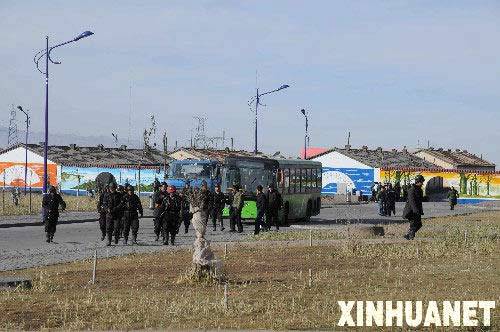Northwest China's Qinghai Province is working all-out to provide assistance to those affected by Monday's 6.3-magnitude earthquake, which has caused three injuries so far.
The quake, which rocked the Mongolian-Tibetan Autonomous Prefecture of Haixi at 9:22 AM Monday, has damaged at least 500 houses, causing several old huts to collapse and leaving big cracks in many walls.
The direct economic loss is valued at 6 million yuan (about US$857,000), said an official with the administrative committee of the Da Qaidam District, the epicenter of the quake.
The committee set up 120 tents Monday night to accommodate people whose houses were destroyed, but still not enough for all the 259 families affected by the quake, said the committee's deputy chief Gu Xiaodong.
The quake caused no death or injury among the residents, but three workers at Dameigou Mine, about 15 kilometers from the epicenter, were slightly injured when they were evacuated from the area among 157 miners. They were immediately sent to a hospital in Haixi prefecture's capital Delinha.
 |
|
The Dameigou Coal Mine is about 15 kilometers from the epicenter. All workers were evacuated safe areas after the earthquake. |
Da Qaidam, which literally means "a big salt lake" in the Mongolian dialect, is rich in mineral resources, with one of the largest lead-zinc mines in western China and several coal mines.
The quake has left cracks in many buildings in the mining area, including the boiler rooms, dormitories, staff canteens and warehouses, a spokesman with Haixi government said.
"Power and water supplies were disrupted for a few hours but were restored by Monday night," he said.
The local government ordered all the 74 factories and mining companies in Haixi to suspend production and all miners were evacuated from underground.
Schools in Da Qaidam and the neighboring cities of Delinha and Golmud were closed Monday afternoon for safety considerations. It's still unknown when the students would get back to classroom, as the Qinghai provincial seismic network had monitored more than 550 aftershocks as of 3 AM Tuesday.
The provincial earthquake administration has installed two mobile tremor detection devices in the epicenter to ensure 24-hour surveillance.
Traffic remained unaffected along the Qinghai-Tibet Railway, the world's highest plateau railroad. But the railway company said Tuesday that when the quake hit, four trains, including a passenger train, were halted for 20 minutes at Yinmaxia station, about 33 km from the epicenter.
"We have tightened safety surveillance along the route, and equipped every train with additional mechanical engineers," said a company spokesman.
Starting from 10 AM Monday, the company imposed a speed limit on all trains passing the quake-battered areas. The upper limit is 60 km per hour between Delinha and Hairag in the west of Qinghai, and 45 km between Delinha and Golmud, about 160 km from the epicenter.
(Xinhua News Agency November 11, 2008)